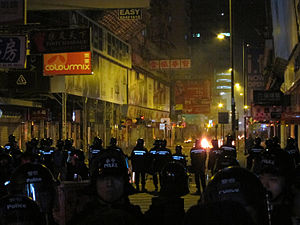Mong Kok civil unrest
| 2016 Mong Kok civil unrest | |||
|---|---|---|---|

Police on Sai Yeung Choi Street South in the morning of 9 February
|
|||
| Date | 8–9 February 2016 | ||
| Location | Mong Kok, Hong Kong | ||
| Caused by |
|
||
| Methods | Rioting, vandalism, arson, and assault | ||
| Parties to the civil conflict | |||
|
|||
| Lead figures | |||
|
|||
| Number | |||
|
|||
| Casualties | |||
|
|||
Civil unrest occurred in Mong Kok, Hong Kong from the night of 8 February 2016 until the next morning. The incident escalated from the government's crackdown on unlicensed street hawkers during the Chinese New Year holidays. Eventual violent clashes broke out between police and protesters. Batons and pepper spray were used by the police and two warning shots were fired into the air, while protesters threw glass bottles, bricks, flower pots and trash bins toward the police and set fires in the streets.
The Hong Kong government has classified the violent incident as a riot (旺角暴動), while some media outlets and social media platforms have opted for calling the event "Fishball Revolution" (魚蛋革命), in reference to fishballs, a popular Hong Kong street food. The violence has been described by The Economist as "the worst outbreak of rioting since the 1960s."
Since the 2014 protests, the popularity of Leung Chun-ying, and his administration, has continued to plunge new historical lows. The relationship between the Hong Kong Police Force, often referred to as "Asia's finest" in the past, and the public have also become strained due mainly to a number of controversies, including the beating of protester Ken Tsang by seven plainclothes officers in Admiralty, the indiscriminate clubbing of members of the public by superintendent Franklin Chu in Mong Kok during the 2014 protests and the considerable delay for them to be prosecuted – in the case of Chu, the police refused to prosecute.
...
Wikipedia
